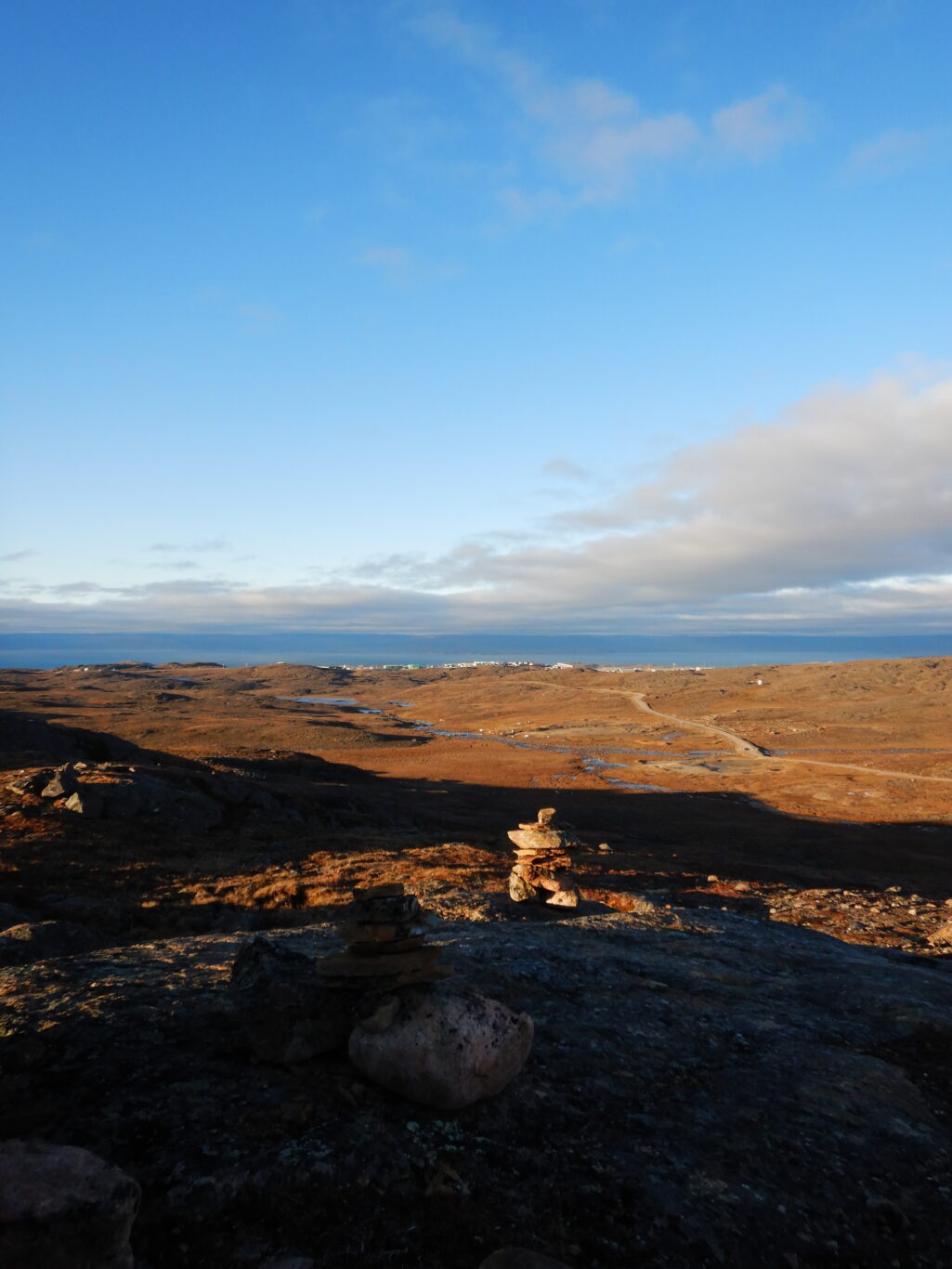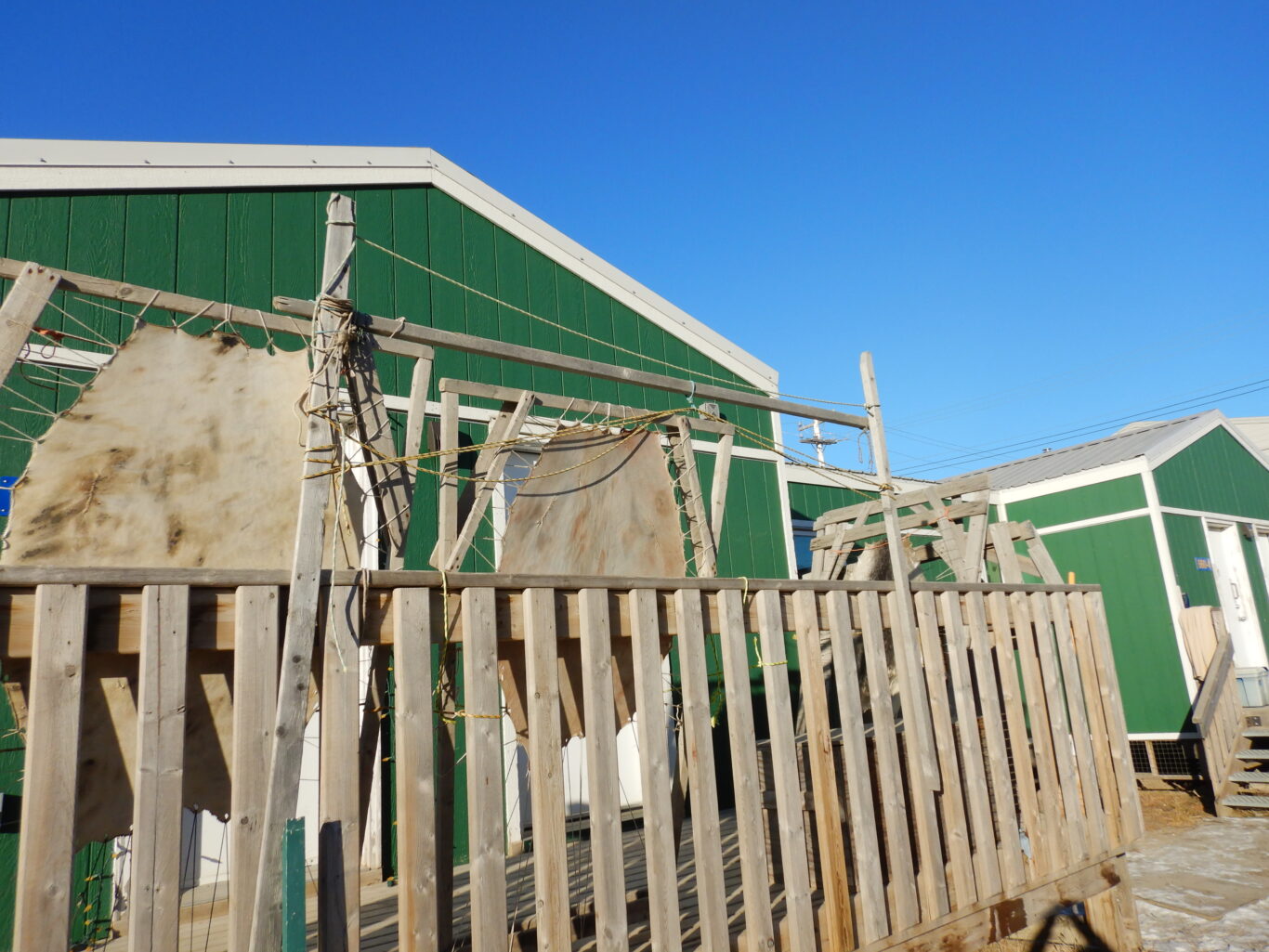Country Food Cargo: Transport Infrastructure and Food Sovereignty in Nunavut
By Katrin Schmid
ᐃᓄᒃᑎᑐᑦ ᖃᓂᐅᔮᖅᐸᐃᑦ (short version in Inuktitut syllabics)
In Nunavut, much of the new infrastructure being built is designed to support various resource extraction projects rather than essential needs like clean water, food, housing, and stable incomes.
My research focuses on how residents in the Qikiqtani region of Nunavut envision the future of their communities and how these ideas connect to the transportation infrastructure being developed today. Specifically, I explore the link between transportation and country food—traditional foods like caribou, fish, and seal—and how this relationship shapes the future of Nunavut. Guided by community members, my work highlights where decision-makers can better prioritize local needs and support for hunters, harvesters, and those who rely on country food.
How I Conducted My Research
I first visited Iqaluit and Pond Inlet in May and June 2022. After asking residents and local organizations which topics are currently of most concern in Nunavut, I decided to focus on how transportation infrastructure affects food sovereignty in the territory. Once I received my research license from the Nunavut Research Institute, I returned for further research between August 2022 and December 2023. Over three separate stays, totaling 12 months, I expanded my work to include five communities: Iqaluit, Kimmirut, Pond Inlet, Resolute Bay, and Grise Fiord.
During my time in these communities, I visited each location at least twice. I attended meetings, workshops, cultural events, hunting trips, concerts, and town hall gatherings. I also volunteered at a local food center, organized three future-planning workshops, and held two focus groups. In total, I conducted about 170 interviews, with more than 60 recorded. I spoke with a wide range of people: members of Hunters and Trappers Organizations, the Government of Nunavut, Inuit organizations, local nonprofits, Nunavut Arctic College employees, airport and shipping workers, Coast Guard staff, students, and new residents who recently moved to work in the region.
Why This Research Matters
Food sovereignty—the ability of communities to control their own food systems—is an issue that affects everyone in Nunavut. For many people, store-bought food is expensive and not always available, making country food even more important. However, the ability to harvest, share, and distribute country food depends on many factors, including transportation networks, fuel costs, government policies, and climate change.
This research highlights how transportation infrastructure can better support local food systems and ensure that Nunavummiut voices are heard in decision-making. The following pages include quotes from community members across the five communities where I conducted my research. While these quotes reflect a range of perspectives, they are a selection of the many voices, stories, and opinions I heard. The quotes have been organized into four key themes:
1. Food sovereignty and access to country food – Challenges in how Nunavummiut obtain, share, and rely on country food.
2. Transportation infrastructure and its impact on food sovereignty – How air, sea, and land transportation affect the movement of food, supplies, and people.
3. Economic and policy considerations – The role of government programs, subsidies, and local initiatives in supporting food security and transportation.
4. Future directions and community priorities – Ideas from community members on how to strengthen Nunavut’s food systems and transportation networks for future generations.
Understanding these issues is essential for ensuring that infrastructure development in Nunavut meets the needs of its people. By listening to the experiences and ideas of community members, decision-makers can take steps to improve food security, support sustainable transportation, and build a future that reflects the priorities of Nunavummiut.
In line with this, the report includes an appendix with policy recommendations informed by key findings from community consultations and research, focused on strengthening food sovereignty and transportation infrastructure in Nunavut.
The report is also available in PDF format and as a short online version in Inuktitut syllabics.
Acknowledgements
I am deeply indebted to all Nunavummiut who shared their time, stories, knowledge, snowmobiles, meals and homes with me – this research would be entirely meaningless without you; thank you. I would also like to thank the Polar Continental Shelf Program (PCSP), Qikiqtaaluk Business Development Corporation, and Nunavut Research Institute for facilitating this research, which was conducted under NRI Research Licenses 01-028-22N-M (in 2022), 01-010-23R-M-Amended (in 2023), and 01-017-24R-M (in 2024). This research was funded by the European Research Council Advanced Grant project “Building Arctic Futures: Transport Infrastructure and Sustainable Northern Communities (InfraNorth)” (Project-ID: 885646), the Foundation for Canadian Studies (Stiftung für Kanada-Studien, Project-ID: T0191/46440/2025), and the University of Vienna Department of Social and Cultural Anthropology.
Credits
Research, writing, and all pictures by Katrin Schmid. Design and editing by Cristóbal Adam-Barrios. Inuktitut translation of the short version by Innirvik Translations. University of Vienna, March 2025.

